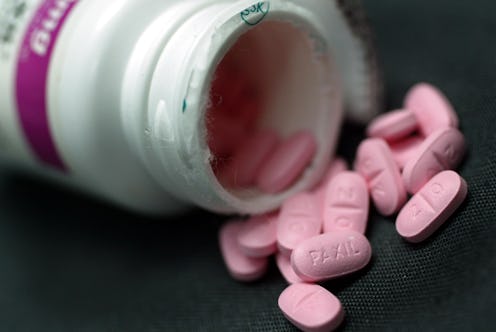Life
Taking Antibiotics With Antidepressants Can Have Serious Consequences — Here's What To Know

It's always tempting to skip over the part of a new patient form at the doctor's office where it asks you to list all the vitamins, prescribed medications, and over-the-counter meds you take, but it's crucial to fill this section out in a detailed and accurate way. Combining common medications (prescribed or not) before checking with your doc can lead to a variety of dangerous drug interactions you never knew about, or can make certain kinds of medicine ineffective. You probably have heard about what happens when you take birth control and antibiotics together, but you might still be wondering if antibiotics can interfere with antidepressants. In fact, taking certain kinds of antibiotics and antidepressants at the same time can have serious, potentially fatal consequences that you've probably never heard of.
As TIME reported, a 2017 study from the National Center For Health Statistics found that 13 percent of Americans over the age of twelve report taking an antidepressant of some kind. Moreover, the CDC estimated in 2013 that four out of five Americans are prescribed some type antibiotic prescription annually. Meaning, if you take daily antidepressants, there's a good chance that you've taken these two medications simultaneously.
There are hundreds of types of antibiotics, which doctors and scientists have categorized into six main categories. Similarly, there are distinct categories of antidepressants, Dr. Zeina Saliba, an Assistant Professor of Psychiatry and Behavioral Sciences at The George Washington University and Inpatient Medical Director of Mental Health Services for GWU Hospital, tells Bustle, but "the most commonly prescribed medications for major unipolar depression are SSRIs."
Considering each antibiotic has unique drug interactions, it's anything but easy (if not impossible) to keep track of all the medications it could interact with. However, if you are on an antidepressant, Dr. Saliba warns you should remember to steer clear of linezolid: an antibiotic used to treat infections like pneumonias.
"A very important and potentially dangerous interaction exists between many of the commonly prescribed antidepressants, and the antibiotic linezolid. When taken together, levels of serotonin in the body can rise, which can result in serotonin syndrome," explains Dr. Saliba. According to Healthline, serotonin syndrome is caused by a excess build-up of serotonin (aka, the neurotransmitter that plays an important role in your mental health) in your brain and body. Though having low levels of serotonin is thought to be risk factor in developing depression, too much of the chemical is dangerous. Symptoms of serotonin syndrome include diarrhea, nausea, tremors, fever, confusion, sweating, and shivering. In severe cases, serotonin symptom can put patients in a coma, or even be fatal.
In addition to antibiotics, Dr. Saliba explains that certain kind of antidepressants can interact with hormonal birth control methods or hormone-based therapies that trans women and people in menopause may be taking. Though the consequences are not life-threatening, antidepressants can make these medications and treatments less effective.
Though it not seem like a big deal, be sure to disclose all (yes, all!) the medicines you're taking and how much to your doctors, so you can avoid any possible drug interactions. "It is very important to have open and honest conversations with your doctors. If you are seeing a psychiatrist, and a primary care doctor or OB/GYN, it is important for them to communicate with each other as well," says Dr. Saliba. "This includes knowing which medications you are taking and how you are taking them, telling them about any non-prescribed over-the-counter medications or supplements you are taking, and reporting any side effects or other concerns."
If you ever need an antibiotics while on antidepressants, there's no reason to get stressed: With hundreds available, you and your physician can find the right one for you that won't jeopardize your health. As long as you communicate with your doc, you can avoid potentially dangerous interactions.